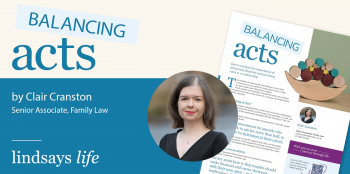Last month the English Court of Appeal refused to allow a heterosexual couple to have a civil partnership instead of a marriage which highlighted various issues worth noting.
In practical terms there are very few differences between a civil partnership and a marriage. They each give the partners/spouses the same legal rights in respect of things like inheritance, tax and divorce.
The most frequently mentioned difference is that adultery isn’t a ground for dissolution (the term used instead of divorce) of a civil partnership but it is still a ground for divorce. This isn’t a hugely important difference but it may be more significant in England than in Scotland.
Very few divorces in Scotland are sought on the ground of adultery (see previous article: Divorce should focus on the future not on past faults) whereas it is more commonly cited as a ground for divorce in England due to the difference in the law there which makes “no-fault” divorce much harder. That’s a different issue which is currently being looked at in England.
In this recent case, Rebecca Steinfeld and Charles Keidan, from London, had challenged the law which says that only same sex couples can enter into a civil partnership. Since 2014 same sex couples have been able to choose between civil partnership and marriage.
The Court of Appeal said that the government should have more time to decide on the future of the law on civil partnerships, but Ms Steinfield and Mr Keidan have said that they intend to appeal the decision to the Supreme Court.
It’s also worth noting that in Scotland we have a separate legal regime for people (same sex or opposite sex) who live together, known as cohabiting, without getting married or entering into a civil partnership. The cohabitation laws don’t give you the same rights as marriage or civil partnership but do provide some protections. (see previous article: If you are cohabiting are you aware of your legal rights?)
Therefore, in Scotland opposite sex couples effectively have the choice of two different legal regimes whereas same sex couples have the choice of three. Also any cohabiting couple can effectively make their own “rules” by entering into a cohabitation agreement which says what should happen if they split up.
It will be interesting to see how this case is resolved in the end of the day. Meantime, all of this does underline the importance of understanding the legal implications of the decisions which you make about your relationship, whether you are thinking about marrying, entering into a civil partnership or living together.
If you would like information on the implications for your particular situation contact a member of our family law team who would be happy to help.








